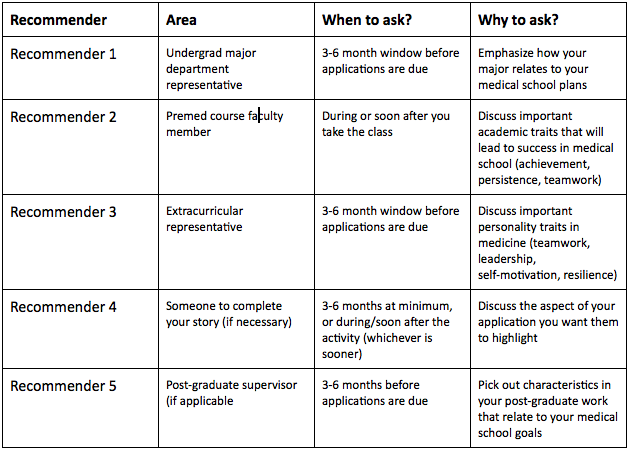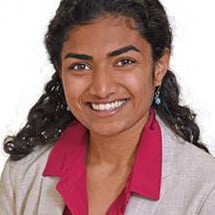For many students looking to apply to medical school, asking for a letter of recommendation can feel pretty daunting, especially if you’re requesting it from people whom you may not have seen for a couple of years. And since you often don’t get to see your letters before submission, this is the part of your application that is least in your control. I remember wondering who the best people to write my letters were, especially coming from an engineering major with not too many ‘traditional’ pre-med biology courses. In this post, I’ll suggest some tips for navigating the recommendation letter process!

How Many Recommendation Letters Do I Need?
In general, most medical schools require at least 3 letters of recommendation. People generally will submit between 3 and 5 letters, depending on where they are in their educational career (ex. in college, just graduated, well-established professionally). Every so often you will encounter someone who sends 9 recommendation letters as part of their application. This is not necessary! I believe there are 3-4 core letters required for a comprehensive medical school application, with a possible 5th depending on how much you have done since you graduated from college. These letters apply generally if you are within 5 years of your college graduation. If you’re more than 5 years out of school, try to get the college letters if you can, and if not, supplement with the most similarity possible from your career and/or post-baccalaureate program.
Recommender #1
Who: Someone from the department of your undergraduate major. Regardless of whether this was Biology or Classical Literature, you spent the majority of your academic undergraduate career in this department, so it is important to have someone who can speak specifically to you as a candidate.
When: If you have a specific advisor with whom you meet regularly, it is good to bring up medical school as early as possible. They will probably be expecting you to ask them for a letter, but giving them at least a 3 month window is common courtesy. If you are getting a letter from someone who doesn't already know about your plans, try to let them know about 6 months in advance so you can set up a few meetings to explain your goals to them.
How: Make sure to reflect on how your major fits into your medical school plans and share this with this letter writer. This is easier for majors like biology or chemistry, but might be trickier for less 'science-y' majors. Either way, it is important for medical schools to understand your whole educational story. (If you need support clarifying your narrative and deciding on the best way to present yourself, our medical school admissions coaches can help).
Recommender #2
Who: Someone who taught one of your pre-medical courses (make sure there is a professor’s name on it, even if it is a TA who writes most of the letter)
When: It is important to consider this letter early. Often, premedical prerequisite classes are large, and you might have to do a little legwork to reach a point where you feel comfortable asking for a letter of recommendation. Think about your relationship with your professor as soon as you begin prereq courses. If you feel that they could reflect positively on your work, set up a meeting with them soon after the class ends to let them know. That way, the professors won't be surprised if you are reaching out a few years later. If a freshman or early sophomore year teacher is the one with whom you clicked the most, it is okay to reach that far back as long as your other letters reflect your more recent performance and personality developments.
How: Make sure to put in effort to establish a relationship with a prereq professor. Seek them out in office hours, ask questions about exams, and answer questions in discussions. They will be able to write a much more personal (and effective) letter if they know you outside of your grade in the class.
Recommender #3
Who: A faculty/senior member involved in one of your extracurricular activities
When: If you are involved in the activity through your application process, follow the guidelines from above (give them a 3 month window if they already know you are applying to medical school, and 6 months if they don't know). If you have graduated or the activity ended before you apply, approach this person immediately after you leave so they they know to expect a request.
How: Set up a meeting with them and be upfront about the aspects of this activity that you think help support your application's personal narrative. This recommender is in the best position to reflect on your positive traits outside an academic setting, so traits like leadership, organization, and self-motivation could be important things to try to mention. Teamwork and collaboration are also highly valued in medical environments; if you have clear examples of how you worked well in a team, or navigated a group through a tricky time, be able to articulate that clearly. If you have good examples, you can bring these up with this writer during the conversation, and then follow up with an email recapping the list you mentioned.
Recommender #4
The fourth letter is completely up to you. As I have alluded to, you want your application to reflect your personal story and the characteristics that support that story. If the first 3 letters encompass the important areas of your story, then there's no reason to add a fourth letter that might be redundant. If you feel, however, that there is an important part of your story that has been left out, use the fourth letter to cover that topic.
For instance, if you completed a minor program or a study abroad that was very influential to your decision to pursue medicine or your future goals, ask a faculty member or supervisor from that program to reflect on your participation.
Recommender #5
If you have already graduated from undergrad and have accumulated significant experience post-grad that you think is an important player in your application, consider requesting a 5th letter.
Who: Ask someone at a senior level in your post-grad life. If you are working, your boss or immediate supervisor is a good bet. If you’re still a student (ex. in graduate school), ask your most direct mentor.
When: These letters will probably be a little easier to obtain than any school ones, since chances are you are still working with your recommender.
How: It is still best to ask them in a dedicated meeting, as opposed to casually in an elevator or while walking out the door. Come prepared to the meeting (your resume is the most important to thing to bring! If you have ideas about your personal statement already, bring that too) so that they can directly ask you questions about why you want to go to medical school and what factors you would like for them to emphasize.
There is also a lot of confusion regarding what to do AFTER the application process. In general, I don't think elaborate gifts are necessary for all of your recommenders. A nice hand-written note thanking them for their letter and updating them about the outcome of the process will be highly appreciated. It is great for professors to feel that their letter helped a student pursue their next goal.
Do you have any questions about how to approach professors and potential recommenders? Feel free to reach out to us here, and we’ll get back to you soon.

Comments